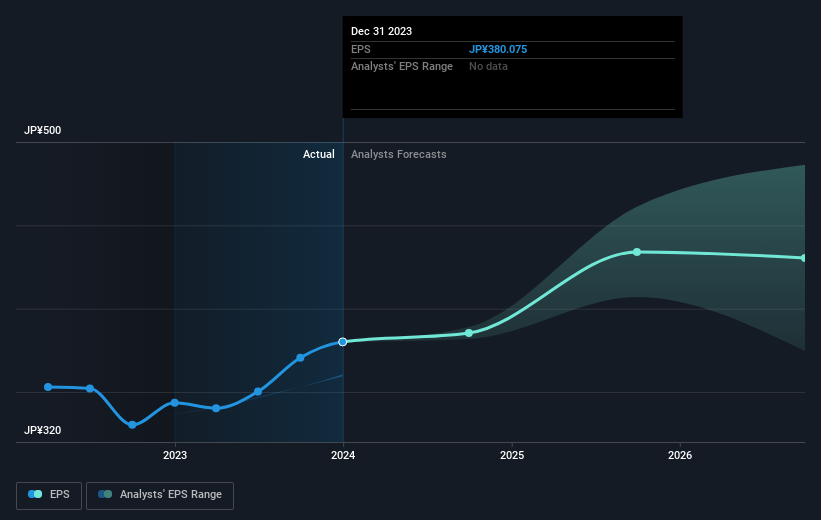Stock Analysis
- Japan
- /
- Trade Distributors
- /
- TSE:9699
Nishio Holdings (TSE:9699) stock performs better than its underlying earnings growth over last three years

You can receive the average market return by buying a low-cost index fund. But you can make superior returns by picking better-than average stocks. Notably, the Nishio Holdings Co., Ltd. (TSE:9699) share price has gained 34% in three years, which is better than the average market return. Also positive was the solid 25% share price increase over the last twelve months.
Since the stock has added JP¥11b to its market cap in the past week alone, let's see if underlying performance has been driving long-term returns.
View our latest analysis for Nishio Holdings
To paraphrase Benjamin Graham: Over the short term the market is a voting machine, but over the long term it's a weighing machine. One way to examine how market sentiment has changed over time is to look at the interaction between a company's share price and its earnings per share (EPS).
During three years of share price growth, Nishio Holdings achieved compound earnings per share growth of 26% per year. This EPS growth is higher than the 10% average annual increase in the share price. So it seems investors have become more cautious about the company, over time. We'd venture the lowish P/E ratio of 10.60 also reflects the negative sentiment around the stock.
The image below shows how EPS has tracked over time (if you click on the image you can see greater detail).

We know that Nishio Holdings has improved its bottom line lately, but is it going to grow revenue? If you're interested, you could check this free report showing consensus revenue forecasts.
What About Dividends?
As well as measuring the share price return, investors should also consider the total shareholder return (TSR). The TSR incorporates the value of any spin-offs or discounted capital raisings, along with any dividends, based on the assumption that the dividends are reinvested. Arguably, the TSR gives a more comprehensive picture of the return generated by a stock. We note that for Nishio Holdings the TSR over the last 3 years was 47%, which is better than the share price return mentioned above. And there's no prize for guessing that the dividend payments largely explain the divergence!
A Different Perspective
Nishio Holdings provided a TSR of 29% over the year (including dividends). That's fairly close to the broader market return. Most would be happy with a gain, and it helps that the year's return is actually better than the average return over five years, which was 9%. It is possible that management foresight will bring growth well into the future, even if the share price slows down. Before forming an opinion on Nishio Holdings you might want to consider these 3 valuation metrics.
Of course Nishio Holdings may not be the best stock to buy. So you may wish to see this free collection of growth stocks.
Please note, the market returns quoted in this article reflect the market weighted average returns of stocks that currently trade on Japanese exchanges.
Valuation is complex, but we're helping make it simple.
Find out whether Nishio Holdings is potentially over or undervalued by checking out our comprehensive analysis, which includes fair value estimates, risks and warnings, dividends, insider transactions and financial health.
View the Free AnalysisHave feedback on this article? Concerned about the content? Get in touch with us directly. Alternatively, email editorial-team (at) simplywallst.com.
This article by Simply Wall St is general in nature. We provide commentary based on historical data and analyst forecasts only using an unbiased methodology and our articles are not intended to be financial advice. It does not constitute a recommendation to buy or sell any stock, and does not take account of your objectives, or your financial situation. We aim to bring you long-term focused analysis driven by fundamental data. Note that our analysis may not factor in the latest price-sensitive company announcements or qualitative material. Simply Wall St has no position in any stocks mentioned.
About TSE:9699
Nishio Holdings
Nishio Holdings Co., Ltd. engages in the construction machinery rental business in Japan and internationally.
Undervalued with solid track record and pays a dividend.

